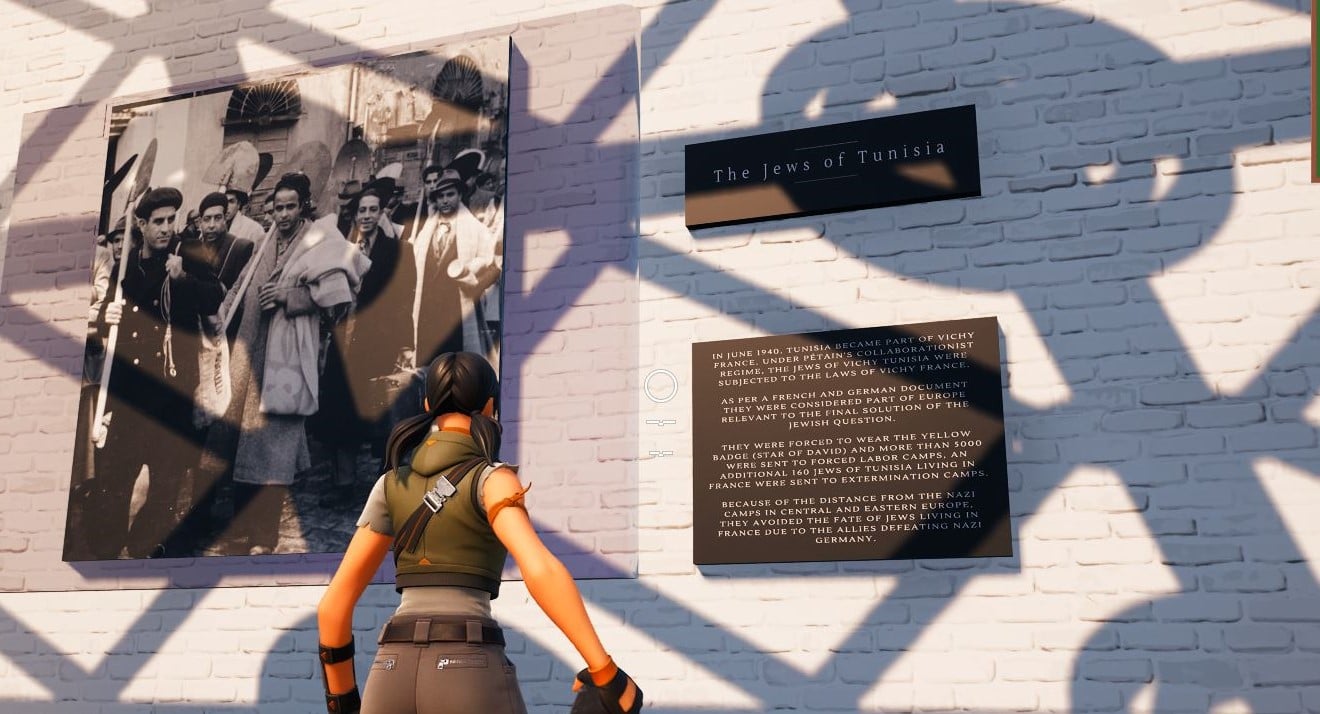
Video game designer Luc Bernard built a virtual Holocaust museum inside the online game Fortnite—but the opening is currently delayed due to a barrage of antisemitic comments fueled by white-supremacist commentator Nick Fuentes, a noted Holocaust denier.
Called the Voices of the Forgotten Museum, the virtual institution contains plaques describing atrocities committed by the Nazis during the Holocaust. It also contains photographs of Jewish resistance fighters and people who helped hide Jewish people escape from the Nazis, reports the Jewish Chronicle.
“I’m about making Holocaust education available to everyone, worldwide, free of cost,” Bernard told Artnet News, noting that Fortnite is currently the most popular metaverse, with more than 400 million users. “Some 80 percent of Americans have not visited the Holocaust Museum [in Washington, D.C.]. That’s not their fault; museums aren’t accessible for most of the population since they’re in big cities. I think museums are great, but we need to think about people who we are not reaching.”
After news of the game’s launch caught the attention of Fuentes, he sent a message to his Telegram chat subscribers with screenshots from an interview Bernard gave in January, speaking about his depression and the negative influence Fuentes had on Fortnite players.
A screenshot of Nick Fuentes on Telegram, talking about Luc Bernard, the creator of a Holocaust museum for the game Fortnite.
Fuentes was first banned from Twitter in 2021, and a second time in January this year, after his account was briefly reinstated. The social media platform suspended another account he startd last week, @heyapple008, but not before Fuentes used it to rally his followers against Bernard.
Bernard sees the negative attention from the far right as a sign of success.
“Nick Fuentes is a young little Nazi, and I’m actually educating people—and it’s working,” he said. “The reaction from gamers and the media and holocaust organizations has been positive. The gaming community has been great.”
The self-funded, independent game designer has been inundated with antisemitic messages filled with negative Jewish stereotypes, demanding he go back to Israel, and even a Photoshopped picture of him on a train to the Auschwitz concentration camp.
“The amount of Nazis going after me, it’s so fucked up,” Bernard said. “You become so mentally numb, it can’t affect you anymore.”
He is concerned that Fuentes’s cult of antisemitic followers will somehow disrupt the museum’s opening, which was originally scheduled for this week.
“I’m waiting until things die down,” Bernard said. “I just don’t want the Nazis to go in it and do Nazi things when it launches.”
The video game developer has taken several measures to ensure that players remain respectful in the museum space, including disabling the use of weapons and “emotes,” which allow players to trigger a variety of quick actions, such as throwing tomatoes and performing dances made famous on TikTok.
Fortnite learned the hard way about the necessity of such precautions in 2021, when it launched an interactive Martin Luther King Jr. museum and had to shut down emotes after players recorded themselves dancing during an audio recording of the civil rights leader’s “I Have a Dream” speech.
A 37-year-old high school drop out who taught himself how to design games, Bernard launched the The Light in the Darkness, a free video game set during the Holocaust, with Epic Games, the creators of Fortnite, earlier this year.
Fuentes also posted a video mocking Bernard and his efforts to educate people about the Holocaust, in which he claimed the video game designer was specifically hoping to counteract his efforts to “red pill” Fortnite players. Audibly laughing at the idea that people’s antisemitic views would be challenged by the experience of visiting the Fortnite Holocaust museum, Fuentes ridiculed the idea that anyone would play the game and realize “maybe I shouldn’t think the Holocaust is funny, maybe I shouldn’t think Hitler memes are funny.”
Luc Bernard’s the Voices of the Forgotten Museum in Fortnite, which aims to educate players about the Holocaust. Screen capture courtesy of Luc Bernard.
He went on to call World War II a loss for Hitler but a victory for the Jews, saying “don’t ask me would you rather, because you’re not going to like the answer.”
Fuentes made headlines in November, when he joined Kanye West at a dinner with former President Donald Trump at Mar-a-Lago. It was around that time that West made a series of antisemitic remarks, culminating in the loss of his lucrative deal with Adidas.